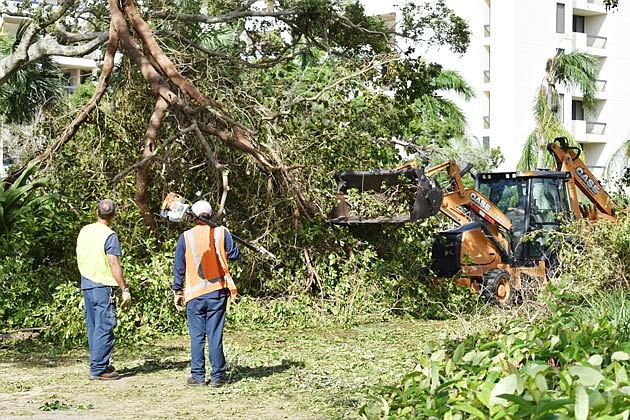- April 17, 2024
-
-
Loading

Loading

It’s difficult to get her off your mind — Irma. She was exhausting. Talk about a Drama Queen.
And then you turn around this week and the doomsdayers in their L.L. Bean rain hoodies at The Weather Channel are at it again.
Ave Maria …
So far, thank goodness for us, Maria looks like she may be headed toward Trump Tower and Chris Christieland.
Let’s hope neither.
Back here in Longboat Key and Sarasota and Manatee counties, we still have some Irma aftermath: the cleanup, the repairs, insurance claims; the how-did-we-do, what-did-we-learn postmortems.
Virtually everyone in this area feels blessed. Was it the weekly hurricane prayer said at every Mass at St. Mary Star of the Sea Catholic Church? The Indian mounds? Climate change? Put it this way: Don’t stop praying.
How did we do?
Be sure to read Fanny and Phill Younger’s letter to the editor on page 9. It’s safe to say they speak for all Longboat residents. To the town staff: Yes, great job! Thank you!
And if you didn’t read it in last week’s Longboat Observer, to emphasize the point, this story is worth reprinting:
“The town was able to protect its wastewater system largely because of a handful of public works employees whose round-the-clock efforts kept several lift stations from overflowing. Though the town’s largest lift stations were still powered, several of the towns more than 40 smaller stations were powerless, requiring manual work to keep them from overflowing. (Town Manager David) Bullock said he had already told Manatee and Sarasota County officials to expect a spill, but that was averted because of town workers.
“These efforts meant in the days following Irma residents were already close to the conditions they knew before the storm. The smooth evacuation planning helped prepare the town for re-entry, even if that process itself didn’t go as hoped for.
“‘A lot of people who are living on the island will never see or never know the work that went into this,’ (Mayor Terry) Gans said. ‘They did a hell of a job and a tireless job making sure they could get back and live here.’”
That was just one of many stories of dedicated service. Based on observations before and immediately after Irma, accolades are also appropriate for most of the region’s first responders and emergency-management officials. Sarasota County Emergency Management Director Ed McCrane in particular. In every situation, successful execution starts with leadership.
Correct us if we’re wrong, but throughout the two-week ordeal with Irma, Sarasota County’s emergency-management officials created a reality of order, competence and readiness — an example for others to emulate. To be sure, this saved lives and property.
Likewise, at the state level. Predictably, of course, a Democratic Party gubernatorial candidate (Gwen Graham) just had to throw darts at “the state” and Gov. Rick Scott for not preparing or doing enough. But we’ll give Scott credit: He was all over Florida 24/7, urging Floridians to protect themselves. Scott, more than any governor we have seen anywhere, has stayed true to what he believes is his first and most important job: protect the safety of Floridians.
There will be the standard critics who will blame Scott for various failures and tragedies (e.g. the eight nursing home deaths). But would you want his job: being the one person to stand as the leader and top decision maker for 20 million people when you have no certainty of where the storm will strike; when it will strike; or how big its strike will be?
Sure, Florida, its counties, cities and citizens can do more to better withstand hurricanes. “The U.S. is excellent at disaster management,” Wim Kuijken, the Netherlands’ senior official for water control policy told the New York Times. But the Dutch way of thinking is completely different: Their emphasis and spending are on working to avoid disaster.
There’s a lesson to put in the postmortem: We should shift marketplace incentives, government resources and the public mindset to avoiding disaster.